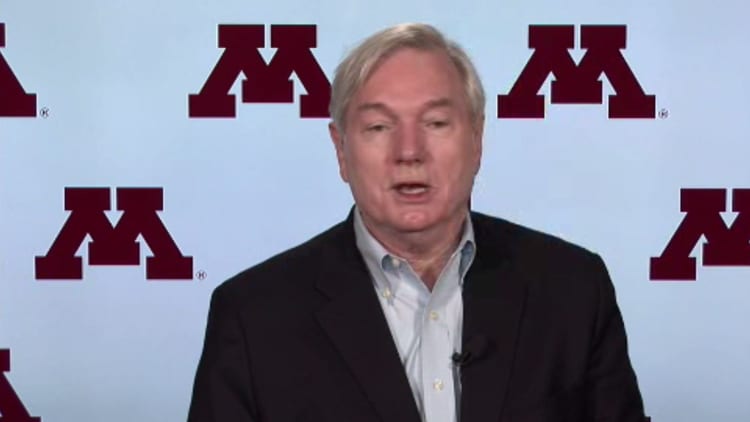
The coronavirus will be here for "many, many months" and the country must decide on a path forward, infectious disease specialist Michael Osterholm told CNBC on Tuesday.
The world is still far from rolling out a vaccine, Osterholm noted, and until then, COVID-19 will present a threat to everyone, especially those most at risk.
"We have to continue to consider what it means to die from this virus. It's a very, very difficult and tragic situation. We also have to have a conversation about how we're going to live with it. We have to figure that out," the director of the Center for Infectious Disease Research and Policy at the University of Minnesota said in a "Squawk Box" interview. "Do we envision an America that for the next 18 months will be in complete lockdown?"
The virus has infected more than 4,661 people across the U.S., killing at least 85 people, according to Johns Hopkins University. The rapid spread of the virus has prompted local and state officials to roll out stringent mitigation policies.
Officials in the San Francisco Bay area ordered 7 million people to "shelter in place" starting at midnight Monday in what appears to be the strictest move in the nation yet. Elsewhere, governors in New York, New Jersey, Connecticut, Washington and Maryland banned public gatherings of more than 50 people and are restricting the operations of restaurants.
The policies echo on a lesser scale what was implemented in China, where entire cities were quarantined and domestic travel severely restricted. However, Osterholm questioned how effective such restrictive policies really are over the long term.
"As soon as China goes back to work and people are on subways and trains, ... we are going to see a resurgence of cases back in China," he said.
Osterholm said a balance needs to be struck that effectively prevents the spread of the virus while also being sustainable enough to last until a vaccine is developed.
"Our hope is that we suppress it, but we will only be saved really when we have a vaccine," Osterholm said, adding that it could be many months before a vaccine is successfully developed. "This is hard. This is really hard."
Biotech giant Regeneron announced Tuesday it aims to have doses of a potential drug for COVID-19 ready to start human clinical trials by early summer. It previously said the drug would be available for testing by late summer.
Osterholm served as a science envoy for health security on behalf of the State Department from 2018 to 2019 and is author of the 2017 book, "Deadliest Enemy: Our War Against Killer Germs."


